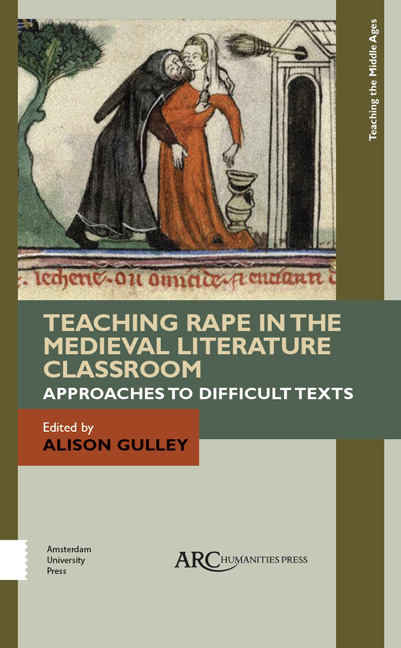Book contents
- Frontmatter
- Contents
- Acknowledgements
- Chapter 1 Introduction: Teaching Rape and Meeting the Challenges of the TwentyFirstCentury Classroom
- Chapter 2 Medieval Saints and Misogynist Times: Transhistorical Perspectives on Sexual Violence in the Undergraduate Classroom
- Chapter 3 Teaching Medieval Rape Culture across Genre: Insights from Victimology
- Chapter 4 Bringing the Bystander into the Humanities Classroom: Reading Ancient, Patristic, and Medieval Texts on the Continuum of Violence
- Chapter 5 From Bystander to Upstander: Reading the Nibelungenlied to Resist Rape Culture
- Chapter 6 Speech, Silence, and Teaching Chaucer’s Rapes
- Chapter 7 Classroom PSA: Values, Law, and Ethics in “The Reeve’s Tale”
- Chapter 8 “How do we know he really raped her?”: Using the BBC Canterbury Tales to Confront Student Skepticism towards the Wife of Bath
- Chapter 9 Teaching the Potiphar’s Wife Motif in Marie de France’s Lanval
- Chapter 10 Sexual Compulsion and Sexual Violence in the Lais of Marie de France
- Chapter 11 Troubadour Lyric, Fin’amors, and Rape Culture
- Chapter 12 The Knight Coerced: Two Cases of Raped Men in Chivalric Romance
- Chapter 13 Teaching Rape to the HeMan Woman Haters Club: Chrétien de Troyes at a Military School
- Chapter 14 Rape, Identity, and Redemption: Teaching “Sir Gowther” in the Community College Classroom
- Notes on Contributors
- Index
Chapter 10 - Sexual Compulsion and Sexual Violence in the Lais of Marie de France
Published online by Cambridge University Press: 23 January 2021
- Frontmatter
- Contents
- Acknowledgements
- Chapter 1 Introduction: Teaching Rape and Meeting the Challenges of the TwentyFirstCentury Classroom
- Chapter 2 Medieval Saints and Misogynist Times: Transhistorical Perspectives on Sexual Violence in the Undergraduate Classroom
- Chapter 3 Teaching Medieval Rape Culture across Genre: Insights from Victimology
- Chapter 4 Bringing the Bystander into the Humanities Classroom: Reading Ancient, Patristic, and Medieval Texts on the Continuum of Violence
- Chapter 5 From Bystander to Upstander: Reading the Nibelungenlied to Resist Rape Culture
- Chapter 6 Speech, Silence, and Teaching Chaucer’s Rapes
- Chapter 7 Classroom PSA: Values, Law, and Ethics in “The Reeve’s Tale”
- Chapter 8 “How do we know he really raped her?”: Using the BBC Canterbury Tales to Confront Student Skepticism towards the Wife of Bath
- Chapter 9 Teaching the Potiphar’s Wife Motif in Marie de France’s Lanval
- Chapter 10 Sexual Compulsion and Sexual Violence in the Lais of Marie de France
- Chapter 11 Troubadour Lyric, Fin’amors, and Rape Culture
- Chapter 12 The Knight Coerced: Two Cases of Raped Men in Chivalric Romance
- Chapter 13 Teaching Rape to the HeMan Woman Haters Club: Chrétien de Troyes at a Military School
- Chapter 14 Rape, Identity, and Redemption: Teaching “Sir Gowther” in the Community College Classroom
- Notes on Contributors
- Index
Summary
While the Lais of Marie de France contain no explicit instances of rape, these twelve short AngloNorman poems dating to the later twelfth century abound with episodes of infidelity, indiscretion, sexual compulsion, and sexual violence. Lovers pursue affairs that imperil their lives and often end in their violent deaths together; knights or their gobetweens are frequently dismembered by jealous husbands; and overwhelming passion compels all manner of secret plotting and betrayal. Even the tales with ostensibly happy endings demonstrate how firmly Western conventions of romantic love link desire and suffering, passion and violence, masculinity and aggression, femininity and threat. Kathryn Gradval identifies the medieval romances of Chrétien de Troyes as the source of these “ideological couplings that will become key in Western literature and culture,” but Marie's Breton Lais share the same tendency “to obscure, rationalize, or sentimentalize sexual violence against women.” While key moves like privileging heteronormative desire, celebrating the devotion between lovers, and describing the conquering, indeed overpowering, nature of love all strike familiar chords with modern readers of the Lais, a discussion of these narrative moves ought also to observe the frequent commodification of the female body, the patriarchal regulation of sexuality, and the erotics of suffering, all of which demonstrate the many ways in which rape culture in socalled courtly literature coheres with presentday constructions on sex and gender. Approaching Marie as a foundation for our modern tropes of sexual love is one way to make the Middle Ages accessible to students, and at the same time defamiliarize our own cultural assumptions about sex, love, desire, and power.
Teaching “Lanval” in Brit Lit I
In the early segment of the British Literature survey, I paired the poetic translation of “Lanval” in The Norton Anthology of English Literature along with the excerpt from Malory's Morte Darthur as an introduction to the genre of medieval romance. My introductory lecture typically included a brief illustration of sociohistorical context6 and some sense of critical reception before we proceeded to studentled discussion, which was grounded on textual analysis and designed to address some thematic element with which students could engage.
- Type
- Chapter
- Information
- Teaching Rape in the Medieval Literature ClassroomApproaches to Difficult Texts, pp. 138 - 150Publisher: Amsterdam University PressPrint publication year: 2018



